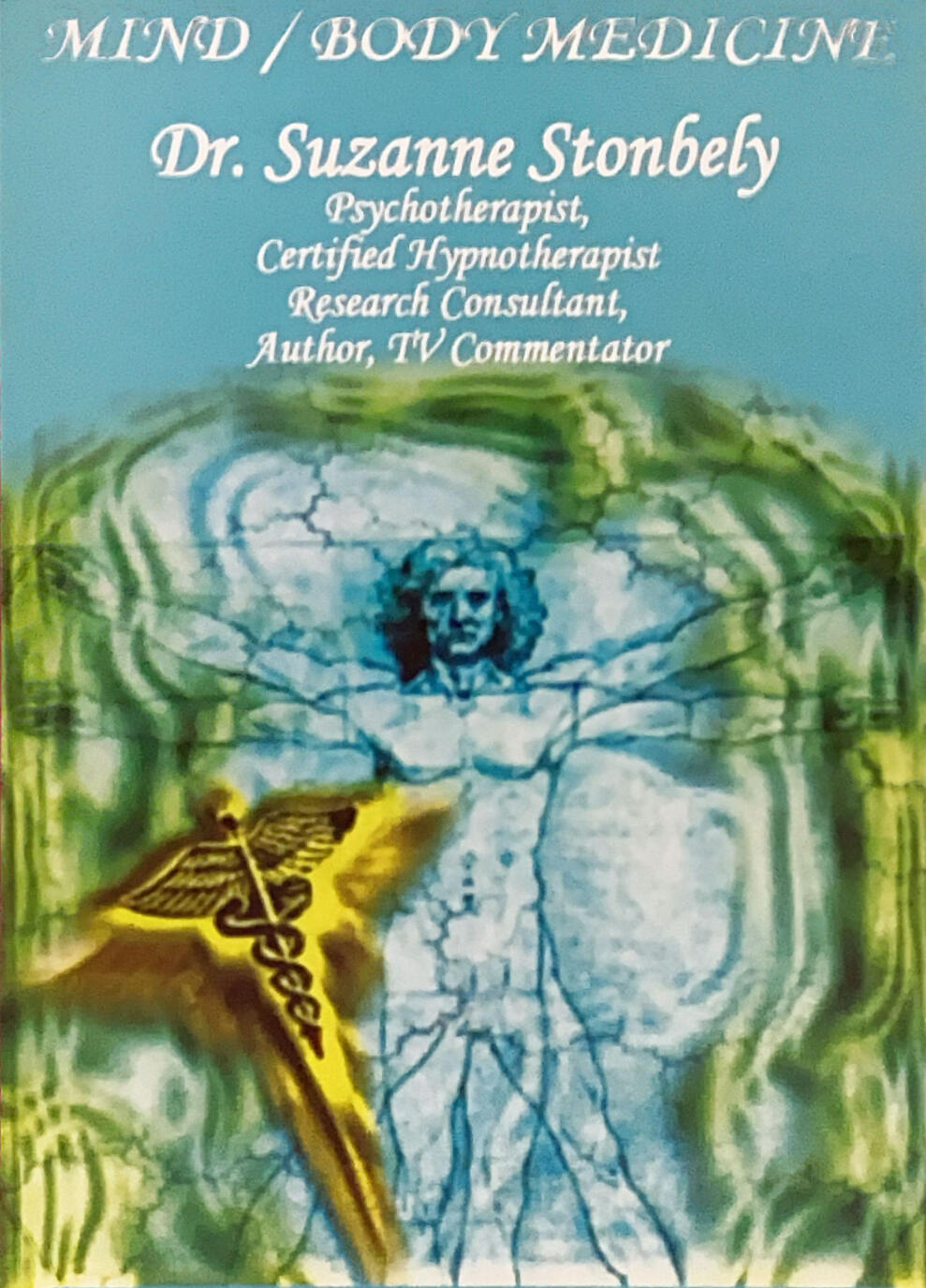Mind Body Medicine
Suzanne Stonbely, PhD
Therapy | Coaching | Team-Building
Are YOU ready to reach your highest potential?
Learn and develop medically and scientifically tested strategies from my 35 years of hospital and university training, research, and design, to create a personalized multi-dimensional plan integrating your Mind, Body, and Spirit for optimal health, relationships, career, corporate team building & life satisfaction.

Hello, I’m Dr. Suzanne Stonbely, a distinguished expert in Mind-Body medicine with over 35 years of experience. As South Beach’s original Mind-Body expert on Lincoln Road, I integrate medical, scientific, and complementary strategies to design personalized treatment plans. My unique combination as a clinician and social scientist allows for a specific, client-centered evaluation empowering your uniqueness with empirical success strategies. I am a renowned compassionate practitioner in CBT, somatic energy, hypnotherapy, self-hypnosis, mindful meditation, guided imagery, NLP, and visualization. Let’s work to create a life you love!
Mind-body medicine focuses on the interactions among the brain, mind, body, and behavior, and on the powerful ways in which emotional, mental, social, spiritual, and behavioral factors can directly affect health, relationships, career & life satisfaction. Allow yourself to create a life you love with endless possibilities.

Offers Telehealth Appointments

Accepts Online Payments

Accepting New Clients
Call now to book an appointment or schedule a complimentary 15-minute consultation!
“YOUR Biography becomes your Biology - BRUCE LIPTON”
About Dr. Suzanne Stonbely

Dr. Suzanne Stonbely
FIU PhD in Social Welfare
Micro Macro Intervention Design and Methodologies
CHT Certified Clinical Hypnotherapist
Florida LCSW
FIU MSW in Social Work
(Retired Licensed R.T./ Medical Illustrator)
UM BA Psychology and Art
MDCC AA Radiological Technology
Pratt Institute
Mind-Body Expert | Licensed Psychotherapist | Digital Creator
Hello, I’m Dr. Suzanne Stonbely, a distinguished expert in Mind-Body medicine with over 35 years of experience. As South Beach’s original Mind-Body expert on Lincoln Road, I integrate medical, scientific, and complementary strategies to design personalized treatment plans. My unique combination as a clinician and social scientist allows for a specific, client-centered evaluation empowering your uniqueness with empirical success strategies. I am a renowned compassionate practitioner in cognitive behavioral therapy, positive psychology, somatic energy, hypnotherapy, self-hypnosis, mindful meditation, guided imagery, NLP, and visualization.Today’s world is undergoing remarkable transformation, with significant societal changes, pandemic induced isolations, and technological based stressors. My online holistic Mind-Body therapy, coaching and seminars provide scientifically based strategies to reset the mind, body and spirit, relationships, and reduce anxiety, stress, insomnia, and burnout.
“Life isn't about finding yourself; it's about creating yourself. So live the life you imagined.” -Thoreau.My goal is to guide you to release past limiting beliefs and scripts, to allow for creating a life you love living, in a totally trusting, accepting and confidential setting. I look forward to guiding you to reach your highest authentic potential. Let’s work to create a life you love!
Experience
35 years of Mind-Body Experience
As a Therapist, Professor, Research in Hospital, University Settings, Private Practice, Corporate Trainer, K- 12 Schools, Chronic IllnessStress Management: Relationships Celebrity / Models / Executives / MD RN Attorneys / Professionals Life Coaching, and Media Consultant.
Research & Advocacy

Current Research and Activities
Dr Stonbely is currently researching and developing interventions for:- COVID-19 anxiety, isolation, insonmia
- Executive Florida Relocations
- Huricane Anxiety
- Relocation and Career Transition Coaching
- Strategic Mindset Coaching for Leadership Teams building
- Collaborative Cultures and Culture Transformations
- Using Neuroscience effectively in Leadership, Peak Performance and Optimal Health
- MicroPractices to reduce burnout, increase mindfulness, wellbeing and focus
- Decreasing side effects of long COVID-19 symptoms employing Mind Body Medicine tools and skills
- AI and Digital Creator interface with behavioral neuroscience interventions
Dr. Stonbely's Dissertation
Note: In 1994, the rate of occurrence of breast cancer was 1 out of 11 women.
Today, it's 1 out of 8 women...
Determinants of Noncompliance of Breast Screening Behaviors Among Dade County Women (Women's Health, Florida).
The purpose of this study was to examine and determine the relationship of variables regarding women's noncompliance to breast screening behaviors Self Breast Examination (SBE), Clinical Breast Examination (CBE), and Mammography) as a needs assessment for intervention research and development directed at decreasing noncompliance of breast screening behaviors. A telephone interview was employed to gather a stratified random sample of Dade County's three main ethnic communities: Hispanic women, non-Hispanic White women and non-Hispanic Black women.
The objectives of the study focused on three primary areas of exploration:(1) Psychological Variables examined were: anxiety, cognitive distortions associated with cancer, knowledge of cancer, and perceived cancer self-efficacy and self breast examination self-confidence,
(2) Access Variables examined were: utilization of medical services, insurance coverage, and household income,
(3) Socio-cultural Variables examined were: ethnicity, age, education level, religiosity, marital status, and employment.
The research employed a random stratified cross-sectional sampling frame. A telephone survey was utilized to:
(1) increase the response rate from face to face interviewing, and,
(2) reach a large random stratified sample of Dade county women (N = 395) (in a timely fashion). The questionnaire was designed for this study specifically to measure three psychological dimensions, access variables of women's health practices, socio-cultural variables, and demographics and served as a basis to answer the five research questions of the study.
Results: The results revealed anxiety, knowledge of cancer, SBE self-confidence, annual checkup, yearly gynecological and country of origin to be significantly correlated with the dependent variable, total breast screening behaviors. Systematic evaluation of the significant variables and their implications for social work intervention, development, and research are presented.
This dissertation citation and abstract are published with permission of ProQuest Information and Learning. Further reproduction is prohibited without permission. ©️1994 Suzanne Stonbely, PhD
https://foundation.asrt.org/what-we-do/research-grants/dissertation-directory/ag9417611/Publication Number: AG9417611
School: Florida International University
Services
What's on your mind?
Economic Stress
Depression
Anxiety
Panic/Phobia
Relationships
Mindful Parenting
Executive Stress Management
Addiction
Sleep Issues
Body Image
Grief
Relocation
Mind Body Tools
Cognitive Behavioral Therapy
Mindful Meditation
Hypnotherapy
Visualization
Guided Imagery
Rational Emotive Therapy
Quantum Integration
Healing Imagery
Energy Balancing
Dream-Work
Optimal Health
Positive Psychology
S.M.A.R.T. Goals
Ready to get S.M.A.R.T.?Smart Stress Management and Resiliency Training refers to the intentional use of evidence-based tools, personalized insights, and adaptive strategies to effectively regulate the stress response and build long-term psychological, physiological, and emotional resilience. It integrates self-awareness, neuroscience, behavioral science, and lifestyle interventions to sustain performance, well-being, and recovery.
Take the first step now
Call 786.686.5036 for a free consultation
Types of Therapy
Cognative Behavioral Therapy
Cognitive-behavioral therapy stresses the role of thinking in how we feel and what we do. It is based on the belief that thoughts, rather than people or events, cause our negative feelings. The therapist assists the client in identifying, testing the reality of, and correcting dysfunctional beliefs underlying his or her thinking. The therapist then helps the client modify those thoughts and the behaviors that flow from them. CBT is a structured collaboration between therapist and client and often calls for homework assignments. CBT has been clinically proven to help clients in a relatively short amount of time with a wide range of disorders, including depression and anxiety.Source: PsychologyToday
Dialectical Behavior Therapy
Dialectical Behavior Therapy (DBT) is the treatment most closely associated with Borderline Personality Disorder (BPD). Therapists practice DBT in both individual and group sessions. The therapy combines elements of CBT to help with regulating emotion through distress tolerance and mindfulness. The goal of Dialectical Behavior Therapy is to alleviate the intense emotional pain associated with BPD.Source: PsychologyToday
Rational Emotive Behavior Therapy (REBT)
Rational Emotive Behavior Therapy (REBT) offers valuable support in identifying and challenging self-defeating thoughts and actions. REBT focuses on present issues, revealing how unhealthy thoughts hinder personal and professional goal attainment. REBT can be beneficial for addressing various negative emotions such as anxiety, depression, guilt, problems with self-worth, and extreme or inappropriate anger. It also aids in changing self-defeating behaviors like aggression, unhealthy eating, and procrastination. REBT utilizes diverse methods and tools, including positive visualization, reframing thoughts, self-help materials, and assigned homework, to reinforce progress between sessions.Source: PsychologyToday
Hypnotherapy
Hypnotherapy focuses on hypnosis, the Greek term for sleep. The practice uses exercises that relax people, bringing them to an altered state of consciousness. This process focuses on mastering self-awareness. Through trance-like analysis, hypnosis decreases blood pressure and heart rate, putting one's physical body at ease. Working with memories, hypnotherapy helps a person to reframe, relax, absorb, dissociate, respond, and reflect. The process reconstructs healthier associations with a person's past events. Dealing with a wide range of conditions, such as anxiety and depression, people become responsive to new solutions that can lead to personal development through hypnotherapy.Source: PsychologyToday
Positive Psychology
Positive psychology explores what enables individuals and societies to flourish. It examines how people can cultivate happiness, strength, and resilience, and ultimately live a fulfilling, meaningful life. Rather than trying to alleviate suffering, positive psychology strives to enhance well-being. Positive psychology is a relatively new discipline, but it has grown widely since its emergence.Positive psychology aims to uncover what allows humans to thrive—things like achieving a professional goal, creating a loving relationship, or feeling awed by nature. The field aims to provide the ingredients that everyone can use to build the most fulfilling life possible. Scholars of positive psychology believe that the good and bad parts of life are equally genuine and that good is not the absence of bad but the presence of well-being and purpose. The goal isn’t to ignore suffering but to establish a better understanding of what allows individuals to flourish.Source: PsychologyToday
Jungian Therapy
Jungian or analytical therapy, developed by Carl Jung, seeks to help people access their unconscious to develop greater self-realization and individuation. Jung, a psychoanalyst, sought to understand the psyche via dreams, art, mythology, world religion and philosophy. The Jungian therapist helps the patient find more meaning in their life, with respect for the mysterious nature of the soul.Source: PsychologyToday
Mind-Body Medicine
Mind-body medicine uses the power of thoughts and emotions to influence physical health. As Hippocrates once wrote, "The natural healing force within each one of us is the greatest force in getting well." This is mind-body medicine in a nutshell.Source: Mount Sinai
Energy Psychology
Energy psychology combines exposure therapy, a Western approach, with holistic techniques to treat mental and physical health conditions. By pairing exposure to anxiety-inducing situations with meridian point stimulation, energy psychology aims to reduce hyperarousal and create healthier responses. Techniques include thought field therapy, tapas acupressure technique, and emotional freedom techniques. While the exact mechanisms of energy psychology are not fully understood, many individuals have reported significant relief from long-standing pain and psychological distress through these interventions.Source: PsychologyToday
Neuro-Lingustic (NLP)
Neuro-Linguistic therapy assumes there is a connection between the mind's processes ("neuro"), language ("linguistic") and behavioral patterns learned through experience ("programming") and that these can be changed to achieve specific goals. A neuro linguistic therapist analyzes the detail of the client's words and phrases used to describe their presenting issues in order to understand the underlying cause. Therapists will then help remodel the client's thoughts and associations in order to reframe or re-progam their preconceptions for better outcomes.Source: PsychologyToday
Mindfulness Based
For clients with chronic pain, hypertension, heart disease, cancer, and other health issues such as anxiety and depression, mindfulness-based cognitive therapy, or MBCT, is a two-part therapy that aims to reduce stress, manage pain, and embrace the freedom to respond to situations by choice. MCBT blends two disciplines--cognitive therapy and mindfulness. Mindfulness helps by reflecting on moments and thoughts without passing judgment. MBCT clients pay close attention to their feelings to reach an objective mindset, thus viewing and combating life's unpleasant occurrences.Source: PsychologyToday
Somatic Therapy
Somatic (from the Greek word 'somat', meaning body) psychotherapy bridges the mind-body dichotomy recognizing that emotion, behavior, sensation, impulse, energy, action, gesture, meaning and language all originate in physical experiences. Thinking is not an abstract function but motivates, or is motivated by, physical expression and action. A somatic approach to trauma treatment can be effective by examining how past traumatic experiences cause physical symptoms (e.g. bodily anesthesia or motor inhibitions) which in turn affect emotion regulation, cognition and daily functioning.Source: PsychologyToday
Solution-Focused Brief (SFBT)
Solution-focused therapy, sometimes called "brief therapy," focuses on what clients would like to achieve through therapy rather than on their troubles or mental health issues. The therapist will help the client envision a desirable future, and then map out the small and large changes necessary for the client to undergo to realize their vision. The therapist will seize on any successes the client experiences, to encourage them to build on their strengths rather than dwell on their problems or limitations.Source: PsychologyToday
Corporate
Where personal insight meets organizational impact.As a clinical researcher, I design emperically proven neuroscience, psychological, and holistic interventions to support high-performing individuals and teams. Whether you're cultivating leadership or strengthening workplace culture, my coaching and team programs are crafted to elevate resilience, emotional intelligence, and sustainable success.
For Individuals and Leaders
Executive Coaching
Life Coaching
Wellness Coaching
Stress Management
Celebrity Coaching
Model Coaching
For Teams and Organizations
Corporate Team Building
Leadership Seminars
Mind-Body Workshops
In-House Wellness Programs
Customized Retreats
Corporate Programs
Results
Corporate programs lead to more cohesive and emotionally intelligent teams, increased engagement, and stronger leadership pipelines. Clients report improvements in retention, productivity, morale, and overall workplace resilience, with long-term benefits for culture and performance.
See what’s possible when leadership and wellness align.Call 786.686.5036 for pricing today
Rates & Services with Dr. Suzanne Stonbely
Individual Therapy Sessions
$250 per hour
- Call 786.686.5036 — we're happy to work with you to keep therapy accessible
- Superbills provided for PPO, Medicare, and out-of-network reimbursement
- Check your insurance 1-800 Benefits line to verify out-of-network coverage---Mind-Body Telehealth Services
Balance your mind, body, and spirit for optimal health, relationships, career, and life satisfaction — all from the comfort of home.Teletherapy & Telecoaching
Individual Therapy – $250 per session (60 minutes)TeleCoaching Package – $400
- Includes four 30-minute sessions (save $100)
- Cancellation before completion reverts each session to $125Mind Body Evaluation
- 60–75 minutes – Full history, intake interview, and findingsEducational Consultation
- 90 minutes – Ideal for new diagnoses or recurring issues
- Get expert insight without entering treatment---Specialized Coaching & ConsultationsEconomic Stress & Wellness Coaching
Support during periods of financial stress or life transition. Learn to reframe worth, identity, and abundance through mind-body awareness.Mind Body Weight Release Coaching
Let go of what no longer serves you. Use your mind's power to release weight and return to the balance your body was designed for.Mind Body Sleep Coaching Package
- Sleep assessment by phone (30 minutes)
- Personalized sleep exercises and MP3 recording
- Four 15-minute weekly coaching callsMindful Parenting Coaching
- 60-minute initial consultation
- Eight 15-minute coaching sessions (twice weekly)
-Includes personalised mindful parenting package---Personalized Hypnotherapy ScriptCustom Hypnosis – $120+
Created based on your unique Hypnotherapy needs after a personalized consultation.Personalized Mind-Body Exercisers - $120+
Personaized based on your Mind-Body needs after a personalized consultation.---Gift Certificates & PackagesMindBody Coaching Certificate – $400
This flexible certificate can be applied to any $400 MindBody service offered by Dr. Stonbely.---
Payment Options
Credit/Debit Cards*
ACH Bank Transfer*
Check
Health Savings Account (HSA)*
Wire Transfer
Accepted through Ivy Pay, a HIPAA compliant payment system
---
Cancellation & Rescheduling Policy
Your appointment time is reserved exclusively for you. If you need to cancel or reschedule, please provide at least 24 hours’ notice to avoid a cancellation fee.- Cancellations with less than 24 hours’ notice will be charged the full session fee.
No-shows are also charged in full.
- TeleCoaching Packages: If canceled before completion, any used sessions will be charged at the regular rate of $125 per session, and the remaining balance refunded.We understand that emergencies happen. If you are experiencing an unexpected illness, emergency, or urgent issue, please contact Dr. Stonbely as soon as possible at 786.686.5036 to discuss options.By scheduling an appointment, you agree to this policy. Thank you for valuing our time together and helping keep our scheduling fair and consistent for all clients.
---
Navigating these options can be challenging, but you don't have to do it alone. I am here to assist you in determining the best path for your unique needs. Whether through the depth and rigor of therapy or the goal-oriented approach of coaching, my priority is your well-being and growth.
Call for a Free Consultation
I invite you to reach out for a free consultation. Together, we can explore your needs and determine whether coaching or therapy, or a combination of both, is the right choice for you. Let's take the first step toward your better future.
Need More?
For further insights into the distinctions and overlaps between coaching and therapy, I encourage you to read the following article:E., (2020). Where Life Coaching Ends and Therapy Begins: Toward a Less Confusing Treatment Landscape. Perspectives on Psychological Science, 15(4), 973-977. https://doi.org/10.1177/1745691620904962.
What is Mind Body?
Now Accepting New Patients
Call (786) 686-5036Empower yourself to create a vision plan for the year
What is Mind Body Medicine?
Understanding Mind-Body Medicine
What Is Mind-Body Medicine?
Mind-body medicine explores how thoughts, emotions, and behaviors can influence physical health. It emphasizes the body’s natural ability to heal when supported by practices like meditation, relaxation, and self-awareness. This approach encourages self-care and respects each person’s capacity to take an active role in their well-being.

Brief History of Mind Body Medicine
The idea that the mind plays a vital role in healing has existed for thousands of years. In traditional Chinese and Ayurvedic medicine, the body, mind, and spirit were seen as one interconnected system. These ancient practices emphasized balance and healing through techniques like herbal medicine, yoga, massage, and mindfulness, long before the term "mind-body medicine" existed. The Greek physician Hippocrates, often called the father of Western medicine, also believed that healing required more than just treating the body. He spoke of the importance of attitude, environment, and lifestyle, and recognized the spiritual and emotional side of recovery.However, by the 16th and 17th centuries, Western medicine began to change. With the rise of modern science and new technologies, the focus shifted toward understanding and controlling the physical body. Tools like the microscope and stethoscope, along with discoveries like bacteria and antibiotics, led to an emphasis on diagnosing and curing illness through external solutions. Emotional and spiritual aspects were largely left behind. Even mental health was seen as separate from the body, and often misunderstood or dismissed.In the 1920s, scientist Walter Cannon introduced the idea of the "fight or flight" response, showing how the body reacts to stress. Soon after, Hans Selye expanded on this, linking chronic stress to long-term health problems. Still, the medical world remained focused on physical symptoms and treatments.During World War II, the power of belief re-emerged in healthcare. On the battlefield, when morphine was scarce, Dr. Henry Beecher found that giving soldiers saline injections — paired with reassurance — often eased their pain. This discovery led to the concept of the placebo effect, showing that belief alone could create real physical change. Beecher later found that up to 35% of a treatment’s success could come from belief and expectation. By the 1960s, researchers began to seriously study how thoughts, emotions, and behaviors affect the body. Techniques like biofeedback, hypnosis, and cognitive-behavioral therapy (CBT) gained credibility, supported by growing evidence. Meditation and yoga became popular in Western wellness circles, although more research is still emerging on their effects.

Key Techniques and Approaches
Mind-body medicine typically emphasizes health-promoting intervention strategies such as relaxation techniques, hypnosis, guided imagery, and meditation — defined as a conscious mental process using specific techniques (such as focused attention or breathwork) to quiet the mind and relax the body.The field also includes cognitive-behavioral therapies, group support, autogenic training, and spiritual practices that help individuals explore purpose and meaning beyond material concerns. Spirituality may take many forms, including but not limited to religious expression. Mind-body medicine views illness not only as a disruption of physical health but as a potential opportunity for personal growth and transformation, with health care providers serving as facilitators in that journey.Some mind-body interventions, like support groups for cancer survivors, have become fully integrated into conventional care. While they are still considered part of the mind-body approach, they are no longer classified as complementary or alternative therapies.Mind-body practices make up a significant portion of complementary and alternative medicine (CAM) usage in the United States. In 2002, approximately 17 percent of adults reported using mind-body techniques such as relaxation exercises, meditation, guided imagery, biofeedback, and hypnosis. Additionally, prayer for health-related reasons was practiced by 45 percent of adults, highlighting the widespread role of belief and intention in personal health practices.
Proven Benefits and Outcomes
Heart Health
Mind-body interventions have been shown to reduce mortality and recurrence of cardiac events when combined with standard rehabilitation programs.Chronic Pain
Approaches like meditation, hypnosis, and cognitive therapy help manage arthritis, back pain, and headaches, often reducing pain and physician visits.Cancer Support
Mind-body techniques can improve quality of life, emotional well-being, and coping skills in cancer patients. They may also help ease treatment side effects like nausea and pain.Immunity and Emotional Health
Higher stress levels are linked to greater vulnerability to infections. Positive emotional states and relaxation techniques appear to strengthen immune function.

Scientific Insights on...
Brain Imaging and Meditation
Modern imaging (like fMRI) reveals that meditation activates brain areas linked to attention and emotional regulation. These changes may support immune responses and improve mental health.Placebo and Expectancy Effects
Belief alone can trigger real biochemical responses in the brain. For instance, Parkinson’s patients given a placebo showed dopamine release, proving that expectation can shape outcomes.Stress and Wound Healing
Research shows that negative moods and stress can slow down physical recovery, such as wound healing, by altering hormone levels and inflammatory responses.Mind-Body Medicine in Surgery
Patients who use mind-body techniques before surgery may recover faster and experience less pain. Guided imagery, music, and self-hypnosis can also reduce anxiety and drug use during procedures.

Why It Matters
Modern research confirms what many healing traditions have known for centuries: the mind and body are deeply connected. Stress, beliefs, emotions, and thought patterns all influence our physical health: from our immune system to how we recover from surgery.At So Be Mind-Body PA, we apply this understanding in a therapeutic setting. We use tools like Cognitive Behavioral Therapy, guided imagery, and stress reduction techniques not just to treat symptoms, but to support your body’s healing processes. Whether you’re managing anxiety, chronic pain, or emotional overwhelm, our approach is designed to address the whole person, not just isolated issues.This matters because it leads to care that is more personalized, more effective, and grounded in both modern science and timeless wisdom. It’s not a quick fix. It’s real change, built on a deep understanding of how the mind and body work together.
